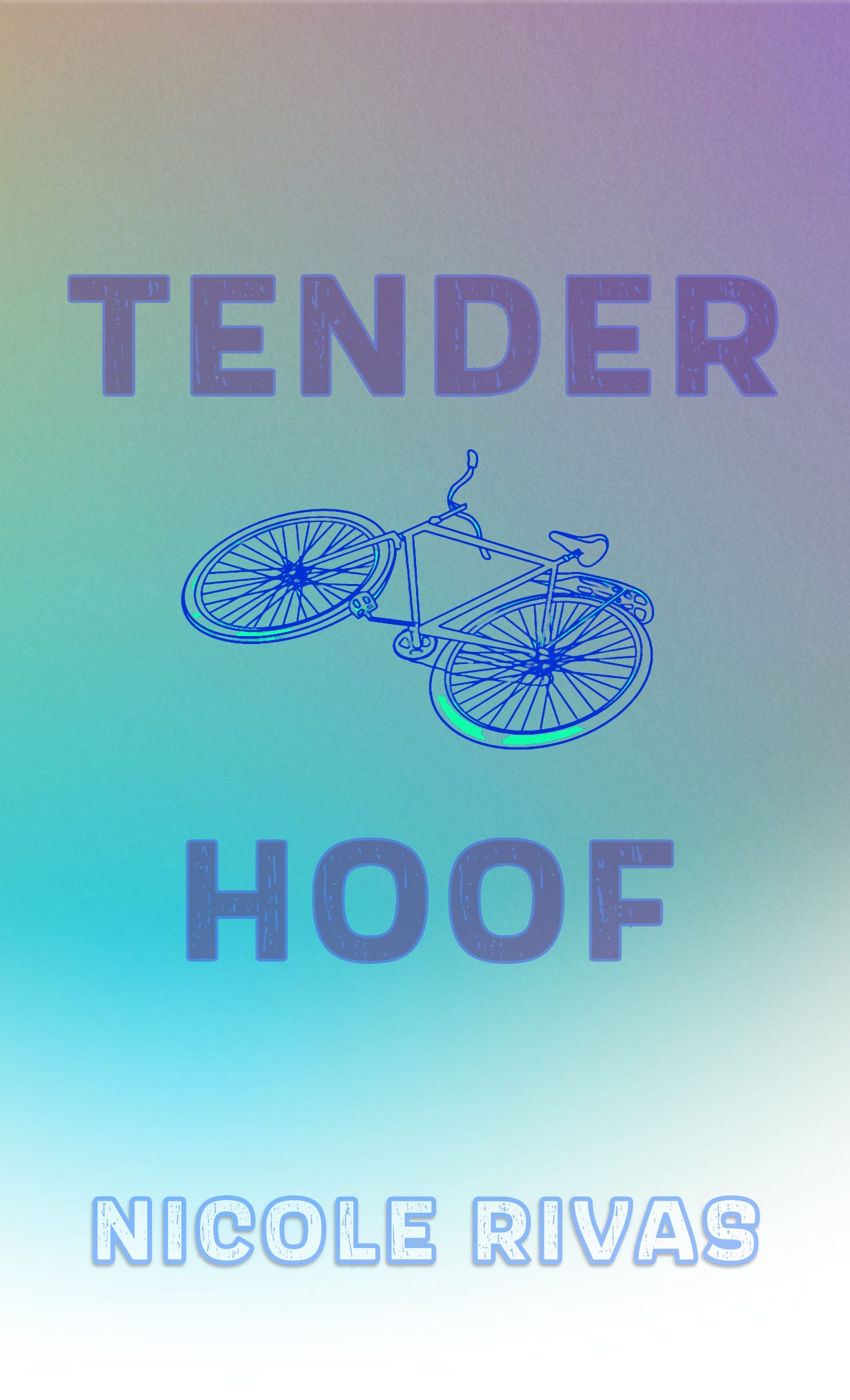Thirty West Revisited: Nicole Rivas
On 90s video games, bimonthly meetups, and the puzzle of organization.
“Thirty West Revisited” is a series of interviews with past and future authors from Thirty West’s vast catalog. Within, you shall experience inspiration for their writing, the process behind crafting their books, and what projects they are working on next. Conducted by Ollie Shane
Nicole Rivas is the author of TENDER HOOF: STORIES (Thirty West Publishing, 2024) and the flash fiction chapbook A BRIGHT AND PLEADING DAGGER (Rose Metal Press, 2018). Her stories have been published in journals such as Longleaf Review, SmokeLong Quarterly, and The Cincinnati Review, and her flash fiction has been anthologized in Best Microfiction (2019), The Best Small Fictions (2019), and W.W. Norton’s Flash Fiction America (2023). www.nicolemrivas.com
Ollie Shane: What got you into writing? Who are some inspirations for you (bonus points if they’re Thirty West authors?
Nicole Rivas: All kinds of things got me into writing, but one early thing I loved was this computer game from the 90s called Wiggins in Storyland. Wiggins was a bookworm character, and he wanted you to be an author. The best part of it is that it wasn’t much of a game, but just a set of templates with different themes and fonts that were meant to jog your creativity and prompt you to write. It was so basic, and really probably the most boring computer game to ever exist, but as a kid, it presented me with a dedicated space to write creatively, so I explored my first narrative fragments there.
Aside from Wiggins, some of the authors who have inspired me are Maryse Meijer, Camille Bordas, Kiese Laymon, Kazuo Ishiguro, Thomas Bernhard, W.G. Sebald, Julián Delgado Lopera, Douglas Stuart, and John Irving.
OS: What was it like getting into and engaging with the writing community? What are its benefits and challenges?
NR: I’m part of a local writing group that meets bimonthly, and it’s great. Everyone is writing something wildly different, but I think that adds great texture to the community and creates personal and artistic growth when there’s novelty and challenge. Generally speaking, I think getting involved in a writing community is always going to equal more opportunities for learning, kinship, and creation.
As a writer who primarily writes very short stories though, a novella feels like it’s akin to climbing Mt. Everest without any backup oxygen.
If anything is challenging in the writing community, I think it can be the unspoken pressure to continually produce work or maintain some sort of consistently productive presence as a writer. I don’t work that way at all. I don’t update social media profiles and connect with writers that way, I’m very inconsistent about submitting work, and sometimes I don’t write for months and months on end. I tend to disappear into my little world of reading and working my day job and enjoying the outdoors and then occasionally pop up with a new story to offer, but it’s not at all reliable. So learning to be okay with that and not comparing my creative life to others’ is huge and necessary for me.
OS: Where did you come up with the idea for your chapbook/poetry collection/novel?
NR: Tender Hoof: Stories isn’t themed in an obvious way, so I don’t think there’s a hit-you-over-the-head aspect to the collection. (Though I do love a good, explicitly-themed collection like Shit Cassandra Saw: Stories by Gwen E. Kirby or How to Pronounce Knife by Souvankham Thammavongsa.) Most of the stories I write just come from heavy experiences and emotions that are a part of being human. I like to explore how characters from all walks of life handle living with loneliness, fear, shame, and regret. If the ugly parts of life are an idea, then nurturing those ideas is at the core of my focus as a writer.
OS: How was it working with Thirty West in your work?
NR: Terrific. I love that Thirty West works to cultivate community between its authors, so that’s been wonderful to be a part of. The team has been so open, caring, and supportive, and I feel that my story collection has found a great home here.
OS: What has been the reception of your work from the wider writing community?
NR: I think my writing has been well-received in the literary circles I tend to put it out into, but I’m sure others would be weirded out or disappointed by the kinds of stories I write. It’s hard to know. I will say that I was ecstatic to have my story, “Hatched,” appear in W.W. Norton’s Flash Fiction America anthology, so within the flash fiction field, I’ve got some great supporters.
OS: What upcoming/current projects have you put out?
NR: I’ve been slowly and quietly working on a novella for the past year or so. As a writer who primarily writes very short stories though, a novella feels like it’s akin to climbing Mt. Everest without any backup oxygen. So, we’ll see what happens. For now, I’m enjoying the deeper process and the puzzle of organization.
OS: Any advice for the readers of Afterimages?
NR: I’m not a big fan of advising because everyone is so unique and their circumstances vary widely. That applies to readers and writers, too. But here’s my writing advice: What I’ve found is that it’s vital to read more than you write, and read widely. I also think it’s important to challenge yourself to try new things in your creative pursuits and to constantly remind yourself that every one of your life experiences is giving you the tools to write something wonderful.
Tender Hoof: Stories, the debut story collection by Nicole Rivas, hits shelves in two weeks (1/26/24)! Through Thirty West or your favorite online retailer.







